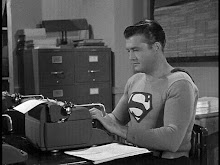In preparing my adaptation of "Dr Jekyll and Mr Hyde," one of my goals is to write a production that is faithful to the story written by Robert Louis Stevenson. Almost every stage or screen version of the story invents characters or subplots, and very few of them ever accurately portray Jekyll or Hyde as envisioned by RLS. So in my quest for a textual adaptation, I ordered the Norton edition of the book. That edition has lots of footnotes and explanatory essays, including a whole section about changes that are made to different performance versions. I've been reading and re-reading the text, and now some essays and notes are helping shape the direction I want to take with my script.
One striking thing about the book is that RLS carefully crafts a story that resists simple interpretations. It is clearly written as an allegory, but RLS was always very cagey to never say what exactly it was an allegory for. Interpretations have varied over the last hundred years as the times have changed, and it was always been co-opted for whatever purpose the writer wanted. The story has reflected the dangers of society, hypocrisy, science, and vanity. But I want my version to have all the complexity that the orginal text has; RLS didn't make the story as simple as a struggle between "good" and "evil," so I don't want my version to be that simple.
Subscribe to:
Post Comments (Atom)

No comments:
Post a Comment